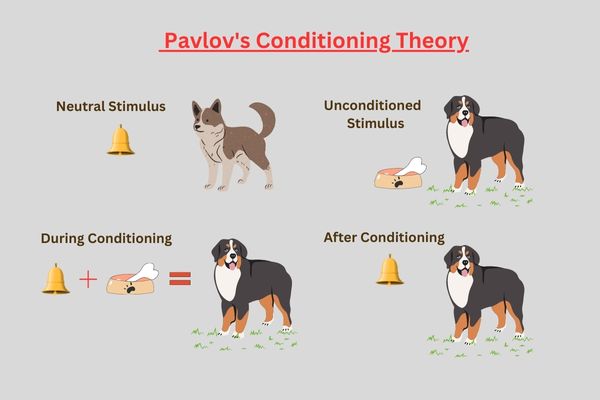In this Article, We would like to study about Pavlov’s Conditioning theory.You have to understand three terms in Pavlov’s conditioning theory, if you understand this then you understand everything.
In this the first term is conditioning, the second term is stimulus and the third term is response.

Contents
Pavlov’s Conditioning Theory experiment
Conditioning is a process that connects or associates an animal or a human brain with Stimulus and Response.
Stimulus is the reason by which the response is created.
Responses are reactions that every living being, animal or human, gives for some reason or the other.
In Pavlov’s experiment, the ringing of a bell was the stimulus while the salivation was the response.The dog knew by the sound of the bell that he will get the food,so he associated the sound of the bell with the food. This connection or association between the sound of a bell and the secretion of saliva was named conditioning.
In the experiment done by Pavlov, salivation on seeing food was called unconditioned stimulus(UCS) while salivation on hearing the sound of a bell was called conditioned stimulus(CS). When food was given to the dog with the sound of the bell, the dog learned that whenever the bell rang, he would get food.
The offering of food was a natural stimulus whereas the ringing of a bell was an unnatural stimulus. In this experiment, an unnatural stimulus was given along with a natural stimulus and it was repeated again and again. When the natural stimulus was removed after some time, the unnatural stimulus elicited the same response as was observed with the natural stimulus.
Factors Affecting Classical Conditioning
1. Motivation
Without motivation the process of learning is not possible. The more motivation you have, the more you will learn. So always be motivated to learn.
2. Repetition
Repetition has an important place in the learning process. Repetition of the UCS and the CS establishes a relationship between the two.
3. Controlled Environment
The main requirement of the teacher is that he can control the environment where the learning process is taking place. Learning process is not possible without discipline.
4. Proximity of time
If there is too much of a gap between giving food and the sound of the bell, the dog would not be able to associate the sound of the bell with food.
Criticism of Questions on Pavlov’s conditioning theory
1. Loss of effect of stimulus
If the stimuli were not repeated continuously, their effect would be lost. For example, if the bell stops ringing for some days, the dog will stop associating the food with the bell.
2. Pavlov considered man as a machine which is not the reality.
Also Read Languages and language Family of India | Hindi language family
Objective Questions on Pavlov’s conditioning theory
Q1. On which animal did Pavlov experiment?
i) dog
ii) cat
iii) Gorilla
iv) monkey
i) dog
Q2. Who propounded the classical conditioning theory?
i) Chomsky
ii) Pavlov
iii) Piaget
iv) Kohlberg
ii) Pavlov
Q3. What is an example of a neutral stimulus in Pavlov’s experiment?
i) Saliva
ii) food
iii) Bell
iv) learning
iii) Bell
Q4. When the child cries, he is given food, so whenever the child wants to eat, he starts crying. This is the example of…?
i) Learning by doing
ii) Classical Conditioning
iii) Stimulus
iv) Trial and error
ii) Classical Conditioning
Q5.Which of the following factors will not affect learning?
i) Subject material
ii) Economic status of the child
iii) Physical condition of the child
iv) Role of the teacher
ii)Economic status of the child
Also Read मुहावरा इन हिंदी | Top 20 मुहावरे
Q6. Which of the following is not a factor that affects learning?
i) Motivation
ii) Repetition
iii) Environment
iv) Wealth
iv) Wealth
Q7. Which of the following Factors Affect Classical Conditioning?
i)proximity of time
ii)Environment
iii)Repetition
iv) All the above
iv) All the above
Q8. Bad habits of a child can be improved by …?
i) Learning by doing
ii) Conditioning
iii) Stimulus
iv) Trial and error
ii) Conditioning
Q9. What are the natural responses of Pavlov’s experiment?
i) Saliva
ii) Food
iii) Bell
iv) learning
i) Saliva
Q10. Classical conditioning occurs when…?
i) When we connect/associates something with the previously neutral with something that produces a natural reaction
ii) When we connect/associates something with the previously neutral with something that produces the desired response
iii) When we make conscious choice
iv) When we are ready to eat.
i) When we connect/associates something with the previously neutral with something that produces a natural reaction
